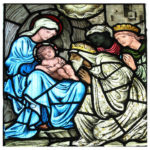We run our website the way we wished the whole internet worked: we provide high quality original content with no ads. We are funded solely by your direct support. Please consider supporting this project.

God’s Love and Your Freedom
The most distinctive aspect of the revelation of God in Christ is Jesus’ demonstration that God relies on love to defeat his enemies and to accomplish his purposes. More than anything else, it was the perfect love of God revealed in the incarnation, ministry, and self-sacrificial death of Jesus that in principle defeated evil and thereby accomplished the will of God.
As he commands us to do, God overcame evil not with violence but by suffering violence on Calvary for the sake of love (1 Peter 2:20-23). This is the very definition of the kind of love that God eternally is, which we have discussed here. And this is the same kind of love that followers of Jesus are commanded to express to all people, including our enemies.
In this light, I believe that plausible models of providence must have at their center a God whose eternal nature is other-oriented, self-sacrificial love, as revealed in Jesus.
Before the creation of the world, God predestined that he would acquire a people—a “bride”—who would receive the Father’s perfect love for the Son and participate in the Son’s perfect love for the Father. However, if love is the goal of creation, then the creation must include free agents. As the early church uniformly understood, for contingent beings such as humans, love (as well as every other moral virtue) must be freely chosen. Had God created us such that we had to love, our love could not be genuine.
To illustrate, suppose a scientist invented a microchip that could control every neuron in a person’s brain and that was so sophisticated it could be implanted without the person knowing it. If this scientist programmed the microchip to do so, she could coerce any person to feel, think, speak, and behave in perfectly loving ways toward her, and her subjects would even believe they were doing this of their own volition.
While they would certainly appear to love this scientist, would we not consider her demented if she mistook the coerced appearance of love to be actual love? In making subjects “choose” to love her, the scientist was actually preventing them from genuinely choosing to love her, for they no longer had the capacity to do this of their own volition. In reality, this demented scientist would just be loving herself through these subjects, as much as if she were manipulating puppets on her hand to mimic loving expressions toward her.
So too, had he wanted to, the all-powerful God certainly could have created a world in which everyone was predestined to feel, think, speak, and behave in perfectly loving ways toward him and each other. But God would know, even if we did not, that we would be mere puppets on his hand. If God instead wants a people who genuinely love him and each other, he must create us with the capacity to choose to love or not. He must give us genuine say-so to affect what comes to pass as we choose to lovingly align our wills with his or not.
Love requires freedom.
—Adapted from Divine Providence: Four Views, pages 186-189
Image by Matt Heaton via Unsplash
Category: General
Tags: Free Will, God is Love, Love, Open Theism
Related Reading

What Is The Warfare Worldview?
Greg has written extensively on something he calls the Warfare Worldview. Many today believe that everything that takes place in the world is ultimately part of a divine blueprint and contributes in some way to the glory of God. As opposed to this view, Greg argues that wills other than God’s are responsible for evil…

A Brief Theology of Sin
We were created for unbroken, loving fellowship with God. We see this in the creation story. As we share in this unbroken, trusting fellowship with God, we participate in the very love that the Father, Son, and Holy Spirit share throughout eternity. We also read in the creation story that sin ruptured this fellowship and sidetracked…

What is the significance of Exodus 4:10–16?
Immediately after convincing Moses of his ability to [somehow!] convince the elders of Israel to listen to him, Moses says, “O my Lord, I have never been eloquent…I am slow of speech and slow of tongue” (vs. 10). The Lord reminds him that he is the Creator and is therefore bigger than any speech impediment.…

How do you respond to 1 Peter 1:20?
“[Christ] was destined before the foundation of the world, but was revealed at the end of the ages for our sake. Through him you have come to trust in God…” This passage reveals that God created the world with Jesus Christ in mind (cf. Col. 1:15–17). The divine goal was (and is) to acquire a…

Challenging the Habit of Judgment
Jesus said, “Do not judge, or you too will be judged. For in the same way you judge others, you will be judged, and with the measure you use, it will be measured to you” (Matt 7:2). In our world where we encounter a nearly constant stream of judgments on social media or the news,…

The Greatest Love Story Ever Told
This is the first week of Advent, the season where we anticipate the coming of Christ. It’s a time to hear and enter into the story of how Jesus came out of love to give his life for us. This grand love story of Christmas taps into a deep intuition we have about the centrality…
